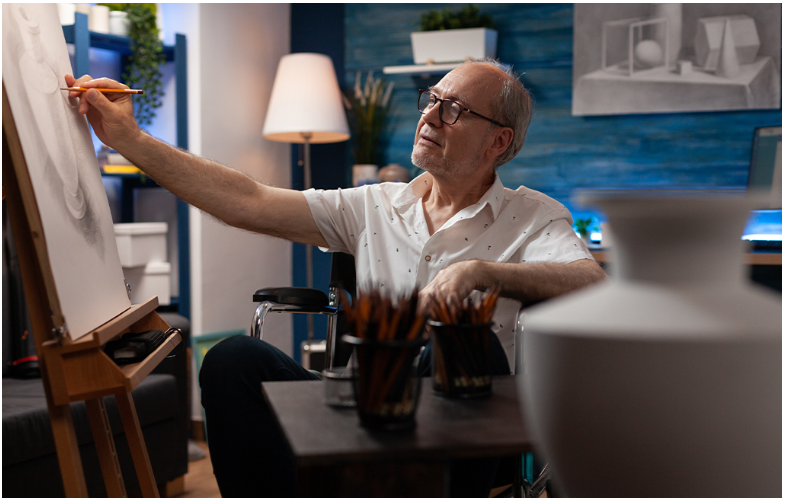
Art therapy provides a canvas to express emotions and thoughts that may be difficult to articulate through talk therapy and words alone. The therapeutic outlet allows people to explore their inner processes and past traumas to gain insights into their emotions, develop coping mechanisms and foster a sense of self-awareness and personal growth.
This creative expression can go beyond the easel, however. In fact, there are a number of creative therapies that can help unlock and release stress.
What is Art Therapy?
Art therapy can involve any number of creative expressions, including but not limited to:
- Drawing, coloring and doodling
- Painting and finger painting
- Collaging
- Jewelry-making
- Textile creation
- Photography
- Sculpting
- Throwing clay
In most cases, an individual will work directly with a professional art therapist to help meet personal and relational treatment goals, such as improving emotional regulation, enhancing self-esteem, resolving emotional conflicts and building stronger interpersonal relationships.
The trained art therapist provides a safe and supportive environment where clients can explore their creativity, gain insights into their behavior and develop effective coping strategies and emotional resilience. This collaborative creative process empowers individuals to navigate challenges, heal from past traumas and achieve a greater sense of well-being and personal fulfillment.
Further, research shows that art therapy can help people feel more in control of their lives, and it may also help to relieve feelings of stress and discomfort.
This is done by emphasizing the use of metaphors and nonverbal cues, such as color and texture, for self-reflection and creative expression that transcends language.
During an art therapy session, an art therapist will sit and observe as the patient works on their creative project. They will then inquire into the piece, asking if certain elements or themes hold particular significance, what emotions or emotional conflicts arose during its creation and how the artwork relates to the patient's current experiences or feelings.
From there, both the patient and therapist are able to gain fresh insights.
What are the Other Creative Therapies?
In addition to artistic pursuits, there are several additional types of creative therapies that can be beneficial in promoting emotional well-being and personal growth.
Dance Therapy
Dance/movement therapy, also called DMT, is another form of therapeutic art that has been found to have both physical and mental benefits. Regular movement can help improve physical strength, flexibility and coordination, while also reducing muscle tension and aches.
Further, dance therapy has been found to help relieve feelings of stress and release pent-up emotions that may be stored in the body. It can also help individuals feel more in touch with their bodies, paying close attention to the physical sensations they feel and their breath — much like the benefits of meditation.
Dance therapy also acts as a vessel for self-expression, allowing patients to explore their creativity and gain confidence in themselves, while also promoting self-awareness.
Drama Therapy
Drama therapy is a type of visual art therapy that opens the curtain to a unique opportunity where patients can explore different roles, relate to others and practice self-expression. Through this type of creative therapy, individuals can:
- Improve self-esteem
- Feel less isolated
- Promote emotional expression
- Develop coping skills
- Understand oneself
During a drama therapy session, a registered drama therapist (RDT) will encourage participants to take part in role-play, storytelling, improvisations, puppetry, enactment and/or drama exercises.
In some cases, these art therapy sessions may directly involve a problem a patient is going through, such as a reenactment of a fight with a spouse, to explore new perspectives and problem-solving techniques.
Expressive Therapy
For those with substance abuse problems, expressive therapy provides an outlet to discuss one’s personal experiences and work through relational patterns. The therapist will then attempt to interpret these experiences and provide valuable insights and/or tools to work through interpersonal and relational conflicts.
In some cases, expressive therapy can be more effective than traditional drug counseling or talk therapy, with improvements in physical and mental health persisting a year after treatment.
Music Therapy
Music is a natural mood-booster, with music therapy focusing on:
- Creating music
- Writing songs
- Singing and dancing
- Listening to music
- Talking about music
This art therapy work aims to improve mental health and relieve feelings of stress and sadness, which may be impacting one’s quality of life.
That said, there are several types of music therapies:
- Analytical music therapy– This approach involves using improvised music (singing or playing an instrument) to explore the unconscious mind and address deep-seated emotional issues. It then combines musical improvisation with verbal processing to facilitate insight and emotional healing.
- Benezon music therapy– This therapy focuses on the use of music to create a non-verbal connection between the therapist and the patient. The patient then works to discover a unique sound that represents their inner emotional state.
- Cognitive behavioral music therapy – Combining cognitive behavior therapy with music, this practice helps patients work through negative behaviors and patterns by way of listening to music, dancing, singing and/or playing an instrument.
- Community music therapy – In a group setting, participants work together to create music, safe relationships and an overall atmosphere of communal well-being.
- Nordoff-Robbins music therapy– This is a creative approach where therapists and clients co-create music to tap into the client’s potential for personal growth and self-expression.
- The Bonny method of guided imagery and music – This method uses classical music and guided imagery to facilitate deep relaxation and exploration of inner experiences through the imagination.
- Vocal psychotherapy – This practice involves using the voice and singing as a therapeutic tool to explore emotions, express feelings and develop a deeper sense of self. It may also incorporate breathing techniques.
How Else Can You Reduce Stress?
In addition to art therapy work, there are several other effective ways to manage and reduce stress:
- Exercising regularly – Physical activities like walking, running, yoga or strength training can help reduce stress by releasing endorphins, which are natural mood lifters.
- Practicing mindfulness– Dabbling in the benefits of journaling,mindfulness meditation, deep breathing exercises and progressive muscle relaxation can help calm the mind and reduce stress by promoting a state of calm.
- Eating well – A balanced diet rich in fruits, vegetables, lean proteins and whole grains can support overall health and help stabilize your mood and energy levels.
- Sleeping well – Establishing a regular sleep schedule, creating a relaxing night routine and optimizing your sleep environment for rest can improve sleep quality and reduce stress.
- Incorporating natural stress support – CBD may help reduce feelings of stress and unease, allowing you to relax into a more peaceful state of being.
Reduce Stress With Zebra CBD
Art therapy is just one way to relieve mental and physical unease. It may also be beneficial to incorporate additional creative therapies and natural stress support solutions.
At Zebra CBD, we offer high-quality CBD topicals, hemp pills and CBD hemp oils for sale that can help you ease into a calmer mental state.
Embrace healing and a well-rounded human experience with our CBD collection today.
Sources:
- Very Well Mind. What is Art Therapy?
- https://www.verywellmind.com/what-is-art-therapy-2795755
- Art Therapy. About Art Therapy. https://arttherapy.org/about-art-therapy/
- Psychology Today. Art Therapy. https://www.psychologytoday.com/us/therapy-types/art-therapy
- Very Well Mind. Dance Therapy. https://www.verywellmind.com/dance-therapy-and-eating-disorder-treatment-5094952
- Very Well Mind. What to Know About Drama Therapy. https://www.verywellmind.com/what-is-drama-therapy-2610360
- Very Well Mind. Supportive-Expressive Therapy. https://www.verywellmind.com/supportive-expressive-therapy-for-addiction-21956
- Very Well Mind. What to Know About Music Therapy. https://www.verywellmind.com/benefits-of-music-therapy-89829








